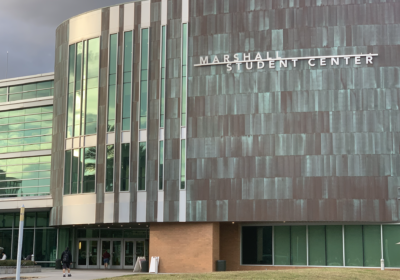Budget battle seeks compromises
USF’s proposed 58 percent funding cut sparked heated debate at Wednesday’s Florida Senate Budget Committee meeting, but it also led to a partial compromise, with the re-injection of $25 million into the proposed University budget.
The money would have been held for the transfer of USF Polytechnic into the independent Florida Polytechnic University. In the initial Senate budget proposal, USF would bear about $128 million total in losses, or about 20 percent of the $400 million cut to the 11 state universities.
Sen. J.D. Alexander, R-Lake Wales, chairman of the Senate Budget Committee and longtime supporter of USF Polytechnic’s split, said in an interview with The Oracle that he has heard students’ concerns on the issue.
“Clearly, we understand that those students didn’t just wake up and say there’s a problem,” he said. “They were encouraged – perhaps they had not the best information, but I think, hopefully, today they got full understanding of the proposals and we, of course, heard their concerns. I think we took a step to some of those as we go forward with the process. We’re all going to work together to find the best set of solutions.”
Yet the meeting was far from cordial, drawing fiery debate on whether the budget cuts were fair and if USF was receiving a proportionate cut.
Throughout the meeting, Sen. Evelyn Lynn, R-Daytona Beach, chairwoman of the Senate Budget Subcommittee on Higher Education Appropriations and sponsor of a bill to immediately make USF Polytechnic the 12th state university, reassured senators and audience members of the fairness of the decision. She said a number of factors were taken into consideration, including potential tuition increases, enrollment growth and USF’s cash reserves.
USF had $121.2 million in reserves at the start of June 2011 – more than the University of Florida, but less than Florida State University and the University of Central Florida. The University projected to have negative $52.7 million in reserves if the proposed cuts were implemented.
However, Lynn said she still believes USF would be able to operate under the originally proposed Senate budget.
“Universities have an amazing skill in handling money,” Lynn said. “It’s unbelievable. They try not to hurt their students, but they do take advantage of tuition increases, but that is not to say that every single one will go to 15 percent just because we’re doing this. If tuition becomes a problem, they’re much aware of that, and (universities) will find ways of helping (students).”
Yet Sen. Jim Norman, R-Tampa, said the presence of USF students – many of who left before dawn in shuttle buses to attend the 9 a.m. meeting – proved they didn’t understand how the cuts were fair.
“The room is full of people who don’t understand,” he said. “Maybe a one-on-one meeting would make them understand they’re not being treated unfairly. Because they’ve analyzed these numbers, and from what I understand is that they do believe passionately that their professors and their classes and things will be affected.”
The discussion with Lynn soon grew heated as attempts to draw answers became more pointed.
“You don’t see the other universities here,” Norman said to Lynn. “It’s compounded with our discussion about the $25 million. If this was any other university in the state, they’d be knocking doors down, too. My plea to you all is to please go back and participate with the university. Explain to them really clear so they will understand it and won’t be shipping students up here by busloads because there’s an outcry.”
Lynn said the money cut from the state universities will be given back next year, and she felt Norman was disrespecting her staff, who created the current budget proposal.
“I really do object to the fact saying that we’re trying to cheat them … because that is not correct,” she said. “If the University of South Florida can’t compute it, then I suggest their finance person, who is excellent by the way, meet with staff to see how it’s done. The fact that you tell me these hundreds of people in the room all can’t compute this – well, they don’t have access to all the facts and figures that we have. There’s no way. We’re the only ones. So I would hope the finance person, not 50 million people, meet with our staff.”
Yet the comments did not faze Norman.
“Maybe you didn’t hear what I said,” he said. “You can get as upset as you want. I love these kids and I love this University. I said, if you would have listened, that these people have a misunderstanding, either with these numbers or how it was impacting. I was not disrespecting anyone. However, I think the disrespect was to USF because you didn’t sit down with them before these cuts came down.”
Alexander did not speak as much as Lynn during the debate, but called Norman’s claims “outrageous” and said that no university would be debilitated by the cuts.
“We can expect every university to continue functioning as it has this past year,” he said.
Amid the budget proposal, $32.7 million will be allocated to Florida Polytechnic University if SB 7100, the bill proposing immediate independence, passes. The bill, which was pushed for later discussion, no longer requires $25 million for transferring of the new university, but will still require USF to pay for USF Polytechnic faculty and students.
USF spokeswoman Lara Wade-Martinez issued a statement calling return of the funds a “step in the right direction,” but said that any notions of USF “sitting on cash” reserves were untrue.
Despite the postponement of the bill’s discussion, USF Polytechnic student body President Damon Dennis spoke about his opposition to the bill.
Dennis, a senior majoring in marketing, said to the committee he would prefer to follow the Board of Governors’ (BOG) conditions set for independence, which include accreditation
and having certain buildings constructed.
“If you want a successful 12th university, do what the BOG asked for,” he said. “You can’t do a transition by flipping a switch. Doing this is putting more pain than needed.”
USF student body President Matt Diaz had the opportunity to speak directly to Alexander about how higher education budgets are taking their toll on students’ pockets.
“I speak to you from the bottom of my heart,” he said. “Tuition has been going up since I’ve been in college. … They should not be increased to fill budget gaps.”
He said he does not support a 12th university when there are no professors or students confirmed to attend, and that the proposed budget cut’s impact would “ripple” across Tampa Bay.
Norman said he will set up a time with senators within the next week to find alternate options for the bill to go forward.
“(Alexander) committed to meeting with USF and try to resolve all of these dollar issues that we have discussed,” Norman said during the meeting. “This $25 million shows their commitment.”
Norman said in an interview with The Oracle that he has kept in contact with USF President Judy Genshaft and hopes to find a solution to USF’s budget cut.
“I want USF to be on the same equal plane as every other university,” he said. “We have an opportunity to start fresh. Compliments to (Alexander) who came and talked to me. He said, ‘You made a good point with “no university in the history of Florida (has had to face cuts like this).”‘”






